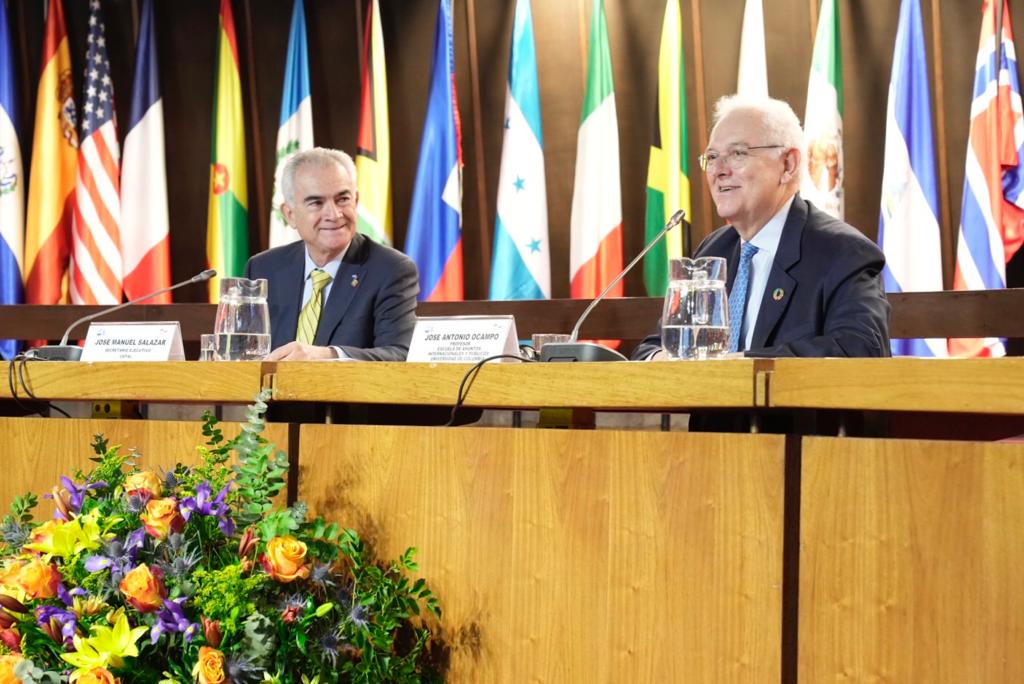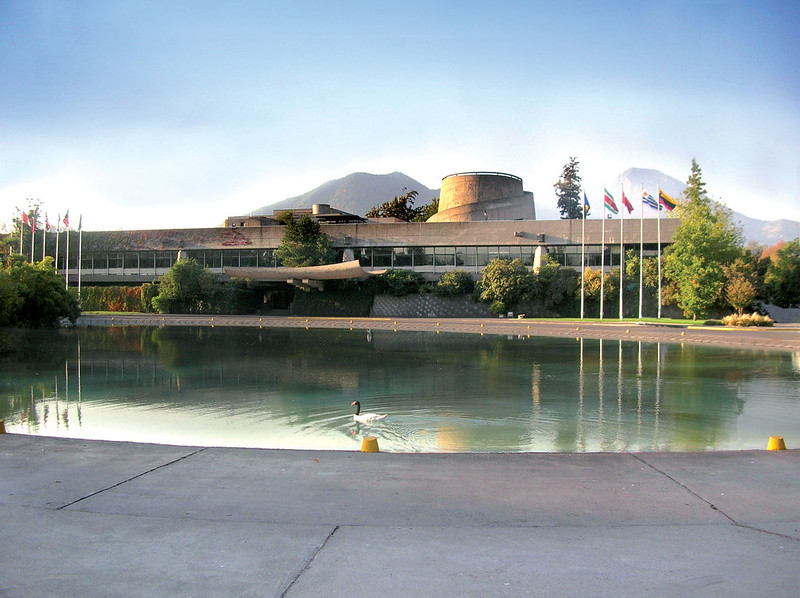José Antonio Ocampo Calls for Implementing Deep Reforms in the International Financial System Based on a New, Denser and Multi-level Architecture
The Professor at Columbia University’s School of International and Public Affairs and former Executive Secretary of ECLAC gave a keynote lecture today organized in the framework of the commission’s 75th anniversary commemorations.

The Professor at Columbia University’s School of International and Public Affairs and former Executive Secretary of the Economic Commission for Latin America and the Caribbean (ECLAC), José Antonio Ocampo, called today for implementing deep reforms in the international financial system, based on a new architecture underpinned by networks of global, regional and subregional institutions, during a keynote lecture delivered at ECLAC’s main headquarters in Santiago, Chile.
The former Minister of Finance and Public Credit of Colombia gave a lecture entitled “Reform of the International Financial System,” the second in a substantial Keynote Lecture Series organized to commemorate ECLAC’s 75th anniversary. He was received by the United Nations regional commission’s Executive Secretary, José Manuel Salazar-Xirinachs.
In his presentation, José Antonio Ocampo addressed four crucial issues for this reform: multilateral development banks, the international monetary system, sovereign debt restructuring, and critical institutional matters.
With regard to multilateral development banks, he stressed the advantages of a dense system in which, along with global institutions, there can be more regional and even subregional institutions.
“This system is very well-developed in the area of multilateral development banks, but not in the international monetary system,” Ocampo advised.
He stressed that the World Bank has been fundamental at critical times, such as 2007-2010, but growth has been more dynamic among traditional regional banks, such as the Inter-American Development Bank (IDB) and the CAF-Development Bank of Latin America, which have been the main contributors of financing to Latin America and the Caribbean.
“Development banks must continue to expand, to offer both structural and countercyclical solutions. It is essential to continue financing the public sector and broaden support for the provision of international public goods,” he affirmed.
With regard to the international monetary system, José Antonio Ocampo emphasized that with all the international financial volatility, one of the clearest effects is that developing countries have had to accumulate many more international reserves than before. That is why the demand for reserves has grown significantly over time, he explained.
He noted that possible reforms of the global reserve system include working on a more active system involving multiple currencies and giving Special Drawing Rights (SDRs) a more dynamic role.
With regard to sovereign debt restructuring, the Columbia University professor said that existing debt renegotiation mechanisms do not provide adequate or timely relief, nor do they have uniform rules for the treatment of debtors and creditors.
He warned that the growing problems of public indebtedness intensified with the COVID-19 pandemic and continue to be very severe. For that reason, he stressed the need for a new, voluntary ad hoc mechanism that would take differences between countries into account and could be supported by multilateral development banks.
José Antonio Ocampo underlined the importance of carrying out three basic tasks: continuing to reform the Bretton Woods institutions, broadening the voice and participation of developing countries in decision-making processes; on economic matters, evolving into a more representative body at the helm of the international economic cooperation system; and building a denser, multi-level architecture, especially strong regional institutions.
At the end of his lecture, Ocampo thanked those attending along with ECLAC for the invitation and gave special recognition to the commission, “which is not only the main research center of the United Nations, but also the main research center on issues related to Latin America and the Caribbean,” he stated.
In the opening segment of the lecture, ECLAC’s Executive Secretary, José Manuel Salazar-Xirinachs, emphasized that the world has changed and continues to change at a dizzying pace. “Technological change, climate change, demographic change, geoeconomic and geopolitical change – to mention a few – compel us to renew our thinking and adjust our assessments and recommendations to these and other changes that have occurred in the national, regional and international spheres,” he sustained.
He added that José Antonio Ocampo’s keynote lecture comes at a critical time as developing countries are in great need of financing and resource mobilization, after making enormous fiscal and policy efforts to respond to the recent cascade of economic shocks that exacerbated historical gaps and needs in development models.
José Manuel Salazar-Xirinachs stressed that reform of the international financial architecture is one of the issues being led by United Nations Secretary-General António Guterres, who put forth 17 proposals for countries’ consideration in the preparatory process ahead of the Summit of the Future.
Furthermore, ECLAC’s highest authority highlighted that José Antonio Ocampo, in his role as Colombia’s Minister of Finance and Public Credit, gave impetus to the creation of the Regional Tax Cooperation Platform for Latin America and the Caribbean, for which ECLAC acts as Technical Secretariat, and which was recently approved by the authorities from 16 of the region’s countries gathered at the First Latin American and Caribbean Summit for an Inclusive, Sustainable and Equitable Global Tax Order, which was held on July 27-28 in Cartagena, Colombia.
The Keynote Lecture Series organized in the framework of ECLAC’s 75th anniversary commemorations began on July 24 with a keynote address by Arancha González Laya, Dean of the Paris School of International Affairs (PSIA) at the Paris Institute of Political Studies (Sciences Po). In the coming months, other prominent thinkers will visit ECLAC to present their views and ideas about the challenges facing the world and the region. The full list of lecturers is available here.
Related content

Ciclo de conferencias del 75° aniversario de la CEPAL
Tenemos el honor de invitarle a la serie de conferencias magistrales de pensadores prominentes que se realizarán en 2023 y 2024, convocadas en el marco de la conmemoración del 75° aniversario de la…

ECLAC Celebrates 75 Years with a Commitment to Continue Working for a More Productive, Inclusive and Sustainable Future for Latin America and the Caribbean
The United Nations regional organisation, which has a variety of commemorative activities planned throughout the year, launched a website that explains its origins, the evolution of its thinking and…
Related link(s)
Country(ies)
- Latin America and the Caribbean
Contact
Public Information Unit
- prensa@cepal.org
- (56 2) 2210 2040
